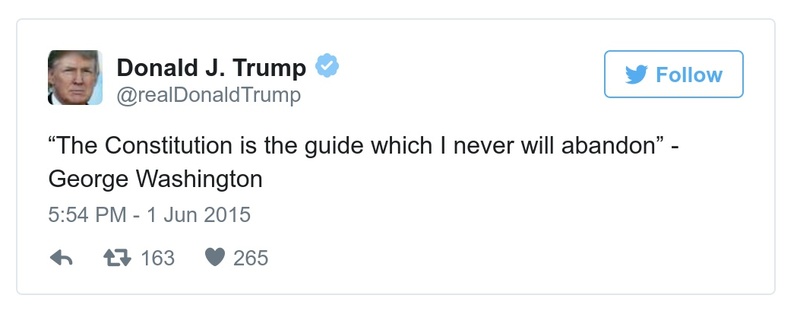The Constitution And Trump: An Uncertain Answer

Table of Contents
Trump's Challenges to Constitutional Norms
The Trump administration witnessed several instances where actions were perceived as exceeding the powers explicitly granted to the executive branch by the Constitution. This perceived executive overreach, coupled with attacks on democratic institutions, fueled significant debate about the balance of power and the rule of law.
Executive Overreach
Trump's frequent use of executive orders raised concerns about circumventing the legislative process. Critics argued these actions expanded executive power beyond constitutional limits, bypassing checks and balances inherent in the system. Furthermore, his administration's challenges to judicial authority and its rhetoric against the free press raised concerns about the erosion of democratic principles.
- Executive Orders: Numerous executive orders, such as those relating to immigration and environmental regulations, faced legal challenges for exceeding the President's authority.
- Challenges to Judicial Authority: Public criticism of judges and questioning of judicial rulings undermined the independence of the judiciary, a cornerstone of the separation of powers.
- Attacks on the Free Press: Frequent labeling of unfavorable news outlets as "fake news" and "enemies of the people" raised concerns about freedom of the press and its crucial role in a democratic society. This rhetoric was seen by many as an attempt to suppress dissent and control the narrative.
These actions sparked widespread discussion regarding the scope of executive power, the limits imposed by the Constitution, and the essential role of checks and balances in safeguarding American democracy.
Attacks on Democratic Institutions
Beyond executive overreach, Trump's rhetoric and actions directly targeted key democratic institutions, potentially undermining their integrity and public trust. This included criticisms of the judiciary, attacks on the legitimacy of the free press, and repeated questioning of election results.
- Critiques of the Judiciary: Open criticism of judges deemed unfavorable to his administration and the suggestion of bias raised serious concerns about the independence and impartiality of the judiciary.
- Undermining the Free Press: Repeated attempts to discredit and delegitimize the media, coupled with restrictions on access, threatened the free flow of information crucial to a healthy democracy.
- Questioning Election Results: Public statements questioning the legitimacy of election results, even before the completion of the official count, sowed seeds of distrust in the electoral process and potentially incited unrest.
These attacks on democratic institutions raised alarms regarding the long-term stability of American democracy and the rule of law. The implications for the future of the American political system remain a significant area of ongoing discussion and analysis.
Legal Interpretations and Court Challenges
The Trump presidency generated numerous court cases that directly tested constitutional interpretations and legal limits on presidential power. These cases offered a platform for contrasting legal perspectives, revealing a lack of definitive answers to complex constitutional questions.
Key Court Cases
Several landmark Supreme Court cases addressed issues arising from the Trump administration, resulting in rulings that shaped constitutional law and the understanding of presidential power. These cases often involved differing legal opinions and interpretations, reflecting the ongoing debate surrounding these issues.
- Example Case 1 (Replace with actual case name and summary): [Insert brief summary and significance of a relevant Supreme Court case concerning Trump's presidency]. This case highlighted the complexities of [relevant constitutional clause] and its application to executive actions.
- Example Case 2 (Replace with actual case name and summary): [Insert brief summary and significance of another relevant Supreme Court case concerning Trump's presidency]. This ruling impacted the understanding of [relevant area of constitutional law] and its implications for future administrations.
Differing Legal Perspectives
Legal scholars offered a range of interpretations regarding the constitutionality of Trump's actions. The lack of a unified legal consensus reflected the inherent ambiguity within certain areas of constitutional law and the subjective nature of constitutional interpretation.
- Interpretation A: [Summary of one legal perspective and supporting arguments regarding Trump's actions.]
- Interpretation B: [Summary of a contrasting legal perspective and supporting arguments.]
This ongoing debate underscores the complexity of constitutional interpretation and the need for continued scholarly engagement with these critical questions.
Long-Term Implications for the Constitution
The Trump presidency has undoubtedly left an enduring mark on the American political landscape, raising significant concerns about the erosion of trust in institutions and the future of constitutional interpretation.
Erosion of Trust in Institutions
Trump's actions and rhetoric fostered increased political polarization and potentially damaged public trust in democratic institutions. This decline in trust threatens the stability of the system and the ability to address critical national issues through collaborative governance.
- Declining Public Trust: Polling data consistently showed a decline in public trust in various institutions during Trump's presidency, including government, the media, and the judiciary.
- Increased Political Polarization: His presidency exacerbated pre-existing political divisions, resulting in a more fragmented and less cooperative political environment.
- Future Risks: The decline in trust and increased polarization pose significant challenges for future leaders and the effective functioning of American democracy.
The Future of Constitutional Interpretation
The Trump presidency presents important lessons for future constitutional interpretation and the responsibilities of future leaders in upholding constitutional principles. The challenges of maintaining democratic norms in the face of partisan pressures and the enduring debates about presidential power remain critical concerns.
- Potential Future Challenges: The experience of the Trump presidency suggests the need for greater clarity and stronger safeguards to protect against future potential abuses of power.
- Lessons Learned: The events of the Trump administration highlight the importance of robust checks and balances and a vigilant citizenry to safeguard constitutional principles.
- Calls for Reform: This period may lead to renewed efforts to address systemic weaknesses in the constitutional framework and strengthen democratic institutions.
Conclusion
The relationship between the Trump presidency and the US Constitution remains a subject of ongoing debate and analysis. The actions and rhetoric of the Trump administration challenged constitutional norms, leading to numerous court cases and diverse legal interpretations. The long-term implications for public trust in institutions and the future of constitutional interpretation are profound. The legacy of this period necessitates a continued examination of "The Constitution and Trump" to fully understand the impact on American democracy and to ensure the ongoing protection of our constitutional principles. We urge you to engage further with this critical issue by researching related topics, discussing your own perspectives, and remaining informed about ongoing developments related to "Trump and the Constitution" to foster informed civic engagement. Continue your research into the complex relationship between Trump and the Constitution—your understanding is crucial for the future of American democracy.

Featured Posts
-
 Find Gypsy Rose Life After Lockup Season 2 Online Free Streaming
May 06, 2025
Find Gypsy Rose Life After Lockup Season 2 Online Free Streaming
May 06, 2025 -
 First Look Tom Holland And Zendaya At Euphoria Following Engagement Announcement
May 06, 2025
First Look Tom Holland And Zendaya At Euphoria Following Engagement Announcement
May 06, 2025 -
 The Best Oscars Afterparty Looks A Red Carpet Retrospective
May 06, 2025
The Best Oscars Afterparty Looks A Red Carpet Retrospective
May 06, 2025 -
 Kilaueas Eruptive Activity A Unique Pattern After Four Decades
May 06, 2025
Kilaueas Eruptive Activity A Unique Pattern After Four Decades
May 06, 2025 -
 Halle Baileys 25th Birthday Cake Cuteness And Love
May 06, 2025
Halle Baileys 25th Birthday Cake Cuteness And Love
May 06, 2025
